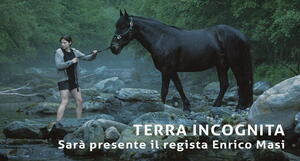ITER features in ARTE documentary
Italian director Enrico Masi has created a poetic documentary that contrasts two visions of our relationship with technology.
It is a documentary film that is hard to categorize. It is not a conventional narrative, nor is it, per se, a documentary by common standards. It is ethereal, philosophical, completely uncommented. One thing is sure: watching Terra Incognita, the latest film by Italian director Enrico Masi, leaves you intrigued—and possibly stunned at the same time.
“The scope of the film is about a strange phenomenon, which is our human behaviour,” explains Enrico. “Society still fights and kills while we have rights, laws and international relationships and technology at such a high level.” This contradiction bothers Enrico “more than anything else,” and so this became the connecting thread of his new film.
It took Enrico seven years to complete the project for which he travelled to France, Italy, Germany, Spain, Switzerland and the United States. There are two protagonists leading us through the “unknown land.” First, a family of eight that has withdrawn from modern civilization after the Chernobyl disaster and who, since that time, lives a simple life without electricity or running water high up in the Italian Alps. The second protagonist is the largest and most challenging scientific and engineering project of our time: ITER.
Enrico gives ITER a specific face and a voice—that of Laban Coblentz, in charge of ITER Communication, who was raised in an Amish-Mennonite community in the United States before he joined the US Navy and later became a nuclear engineer. How do these plots fit together, you may ask? Perhaps surprisingly, they do. Following the thought of German naturalist Alexander Von Humboldt, “the two stories move in parallel in search for a new language for the Anthropocene age.”
Despite its distinctive nature and choice of topic, the film resists taking a viewpoint. It does not seek to convince. It is not pro-technology or anti-technology—nor really pro- or anti- any issue. Rather, it delivers a series of images and scenes—some provocative in their juxtaposition, all rooted in the human experience—and it leaves it to you, the viewer, to interpret.
The film is now available on ARTE, subtitled in a number of languages.
Terra Incognita will also be shown at the University of Turin's 3rd PhD Global History of Empires Conference (18-19 September), the International Documentary Film Festival FICBA in Buenos Aires (5 October) and the 23rd BergamoScienza Festival (9 October).


